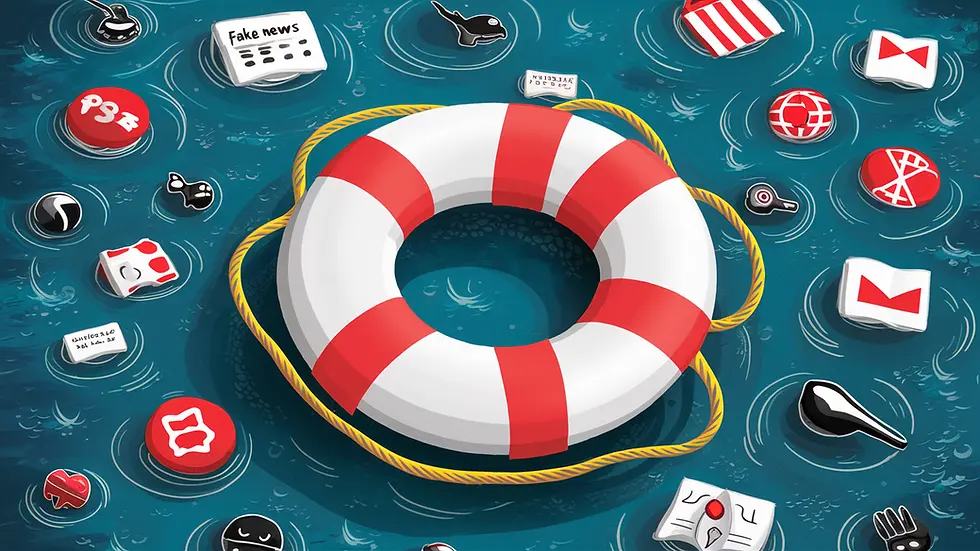Critical Thinking in the Wild: Real-World Examples
- Reelnews
- Jul 19, 2024
- 3 min read
Updated: Aug 1, 2024
Part 2: Critical Thinking Series - FactSPARK
Now, let's look at some real-world examples of critical thinking in action.
Remember when everyone was convinced that drinking your urine was the key to perfect health? (If you don't, count yourself lucky). Critical thinkers were the ones saying, "Hold up, let's look at this crap idea before we start bottling our bodily fluids."
They asked questions like: Where did this idea come from? Is there any scientific evidence to support it? What do medical professionals say? Are there any risks involved? And most importantly, why the hell would we do this when we have perfectly good kombucha?

Another example: is the ongoing debate about climate change. Critical thinkers don't just accept what they hear on TV or read on Twitter. They look at peer-reviewed scientific studies, examine the credentials of the experts involved, and consider the potential biases of different sources. They use tools like FactCheck.org's SciCheck to verify claims and separate fact from fiction.
Critical thinking also comes in handy in everyday situations. Like when you're trying to decide whether to believe your friend who swears that eating nothing but grapefruit will make you lose 20 pounds in a week. A critical thinker would ask: Is this nutritionally sound? What does medical research say about extreme diets? Are there potential health risks? And most importantly, is it worth giving up tacos for a week?

But here's the thing: critical thinking isn't just about debunking myths or winning arguments (although it's great for that too). It's about making better decisions in all areas of your life. It's about not falling for get-rich-quick schemes, questionable medical treatments, or that email from a Nigerian prince who wants to share his fortune with you.
It's about being able to form your own opinions instead of just parroting what you hear on TV or read on social media. It's about being able to see through marketing BS and make informed choices about what you buy, what you believe, and who you vote for.
In a world where we're bombarded with more information than ever before, critical thinking is like a life raft in a sea of nonsense. It's what keeps us from drowning in a flood of misinformation, conspiracy theories, and cat videos (okay, maybe we don't mind drowning in cat videos).

So, how can you start flexing your critical thinking muscles? Well, you can start by questioning everything – not in an annoying, conspiracy theorist way, but in a curious, "let's dig deeper" way. Ask yourself: How do I know this is true? What evidence supports this claim? Are there other perspectives I should consider?
You can also check out resources like The Foundation for Critical Thinking, which offers a wealth of information on developing critical thinking skills. For a deep dive into logical fallacies (aka the sneaky ways our brains try to trick us), the Your Logical Fallacy Is website is a great place to start.

Remember, developing critical thinking skills is a journey, not a destination. It's like going to the gym for your mind – you need to keep at it regularly to see results. But trust me, the payoff is worth it. You'll make better decisions, have more interesting conversations, and be less likely to fall for scams or end up in a cult (always a plus).
So, the next time you're tempted to share that shocking article without checking its sources or buy a product because a celebrity said it changed their life, take a step back. Put on your critical thinking cap (it goes great with any outfit), and start asking questions. Your brain will thank you, and so will everyone who no longer has to listen to you rant about how the moon landing was faked.

FactSPARK: The cornerstone of our Critical Thinking series, providing you with an essential toolkit for navigating the digital information landscape. This peer review process empowers critical thinking in the age of social media and online content.
S - Source Verification
P - Precise Evidence Examination
A - Accurate Cross-Referencing
R - Recognizing Biases
K - Knowledge Application
As you read each post in this series, keep FactSPARK in mind. Apply these principles not only to the information presented here but to all content you encounter online and offline. FactSPARK equips you to discern fact from fiction, combat misinformation, and make informed decisions. It's more than a method; it's a movement towards a more critically aware society. Embrace FactSPARK. Illuminate truth. Transform how you engage with information.

With #FactSPARK, you'll have the tools to navigate the digital age with clarity and confidence. Share your stories, connect with fellow creators, and engage in meaningful dialogue. Download the Reelnews app now and join the conversation!
So no 'hydrogenated' water? :)